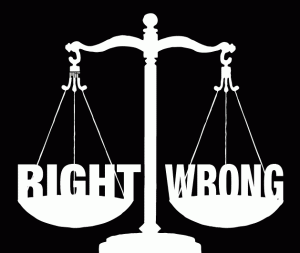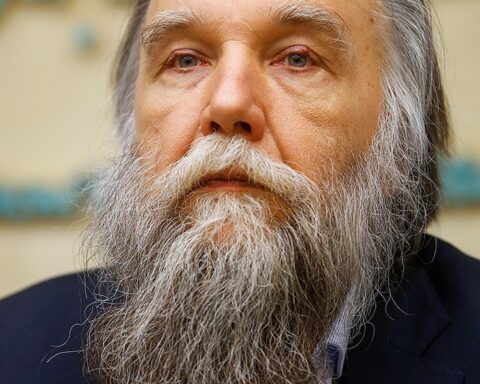The moral argument is a common argument in Christian apologetics. It is very simple, yet very misunderstood.
Premise 1: If objective moral values exist, then God exists
Premise 2: Objective moral values exist.
Conclusion: Therefore, God exists.
 Very simple, but there is a lot to unpack. First, some definitions. When I speak of morality I mean “The quality of being in accord with standards of right or good conduct”. It is important to realize that morality is behaving in the way that you ought to behave. It’s what you do because you are supposed to do because it is the right thing to do even when nobody is looking. God is looking, by the way.
Very simple, but there is a lot to unpack. First, some definitions. When I speak of morality I mean “The quality of being in accord with standards of right or good conduct”. It is important to realize that morality is behaving in the way that you ought to behave. It’s what you do because you are supposed to do because it is the right thing to do even when nobody is looking. God is looking, by the way.
Morality is not defined as that which is legal. I don’t know if Hitler bothered to change the law to make it legal to kill Jews, but he could never make it moral. Today’s atheist is certain that a law that requires transgender persons to use the restroom that corresponds with their biological sex is immoral. It is clear law is not the source of morality once you argue that a law is unjust. You can argue that your rights are being violated, but rights are made of the same stuff morals are. Let’s amend the Constitution. (the 28th amendment: all atheists shall be ground up for fertilizer).
Morality also can’t be determined by majority rule. (although, wouldn’t it be nice to actually vote on abortion?) Think about two cannibals and a missionary deciding on what’s for lunch. Is it moral to eat the missionary because the two cannibals outvote him? Does it really change this if the whole world gets to vote?
It is clear from this that morality cannot be determined by people. People disagree. Liberals say abortion is moral, conservatives say it is not. One is right and the other is wrong, or there is no such thing as “right” and “wrong”.
So is there such a thing as “right” and “wrong”? The answer is, it depends. It depends on what the truth is. If God exists, then He set forth His law, and we are bound to obey it. If He does not exist, and we are products of evolution, then morality does not exist. That’s another reason morality cannot come from people. A person can dictate how he thinks we should behave. We aren’t bound to it. Even a king doesn’t have that power. A king can order the death of all male children under the age of two, but he can’t make it moral.
The logical implication of the belief that humans evolved, and that God doesn’t exist, is that we are also under the law of the jungle. The theory of evolution claims that we are the result of a blind process, that has no goals. The universe doesn’t care if humans exist. Our emotions and social structure are the products of eons of evolution. We are simply self replicating meat machines whose only ‘purpose’ is to replicate the selfish gene. Evolutionary success is determined by survival of the species, generally accomplished by producing the most offspring. (It must kill the atheists to realize that by this measure they are less ‘fit’ since they have fewer children, if any.) Mother earth is not crying over the extinction of the dodo. She won’t cry over the extinction of all life.
Once you realize this, what room is there for morality? You are trying to tell my that your close relative is the monkey down at the zoo that throws his poop at you, yet you have a great set of morals for me to follow. Why should I? What is the reason that I ought to behave as you say? There is none.
I can do whatever I want to you. Might makes right. Animals rape, kill, or steal from each other all the time yet they are not accused of acting immorally. The Christian says people are special. We are made in the image of God and we are above the animals. The atheist says we are animals.
It should be clear that if God does not exist, morality does not exist. This is a dilemma for atheists, because they try to claim things like it is immoral to not let two men get married. Atheists cling parasitically to society’s moral values, keeping only the ones they like. But, if you can throw out some, you can throw out all of them. The result is Nihilism.
Thankfully, when it is darkest, it is easier to see the light. We’ve got the faintest glimmer here. C. S. Lewis said, “My argument against God was that the universe seemed so cruel and unjust. But how had I got this idea of just and unjust? A man does not call a line crooked unless he has some idea of a straight line. What was I comparing this universe with when I called it unjust?”
If we declare an act immoral, we must have something to differentiate an immoral act from a moral one. This is the moral law. This is not the same as the law that says don’t drive on the left side of the street. They do that, in England, I’m told, and I only think slightly less of them for it. A moral law is a law that defines what is right. Many of society’s laws are based on the moral law, but they are not the source of the moral law.
Problem: A moral law requires a moral law giver. We’ve demonstrated there isn’t one to be found in nature or from men. The moral law giver must be God. The atheist may quibble. Why does it have to be God? There isn’t any other source. Why do we have to obey it? Ironically, because might makes right, and God is the mightiest. However, God is a libertarian. You don’t really have to obey it after all, and in fact you cannot. There are consequences of that disobedience however. God sent his Son to remove those consequences.
Is this argument effective? First, one must remember it’s an argument, not a proof. It doesn’t prove the existence of God. For myself, I don’t find it as convincing as some of the other arguments. The weakness is in premise 2. One can just say that objective morality doesn’t exist. In fact, the more intelligent atheists do, because they realize they must.
It can be an effective rhetorical device to use on atheists that claim that some injustice is happening somewhere. According to their worldview, there is no such thing as justice.
Now an atheist does have one valid argument: He can say that since your god doesn’t really exist, you don’t really have any morals either. You just think you do.
That is really the best they can do.







Two attempts by atheists, and I would say they succeeded to some extent.
Ayn Rand’s Objectivism takes it as a given, or at least principles, though she managed to rationalize Adultery, but most objectivists see the rationalization for sophistry.
Stefan Molyneux’ Universally Preferable Behavior (freedomainradio.com – free book in many formats) is better, but still misses something (he is also thoroughly annoyed that Christians are far too nice – his atheist detractors are far worse, and I expect him to be the Socrates that finds Jesus in a year or two – he’s reading Aquinas and from some of his podcasts it sounds like he is starting to crack).
But all such rational constructions have the problem Lewis noted in chapter 2 of Abolition. You can’t get from is to ought. Reason can’t cross into moral. You have to have some prime preference before you can define UPB. Rationality might be more efficient, useful, or true than irrationality, but it is disjoint from morality. If you don’t prefer reason and rationality, Molyneux’ UPB collapses. Nor are “preferences” moral, but I will give Molyneux a semantic pass. He means Universally Right or Righteous or Moral Behavior. At least he isn’t utilitarian.
I should correct a problem with the above. When “Universally Preferable Behavior” misses the point. What IS preferred v.s. what OUGHT to be preferred. The long argument is the latter, but like everything before it fails to bridge the gap. St. Paul, “Why do I do the things I don’t want to do”. He IS a sinner, he OUGHT not sin.
Only God can bridge the gap. That may sound bold, but if there is an ultimate judge, then IS and OUGHT are the same thing at the Bema Seat or the White Throne. Moreover I OUGHT to seek to more clearly understand what IS moral as I will be judged.
“Atheists cling parasitically to society’s moral values, keeping only the ones they like.”
Yes.
tz: Abolition is a stellar discourse on understanding God’s Law and how Natural Law must rest upon it.